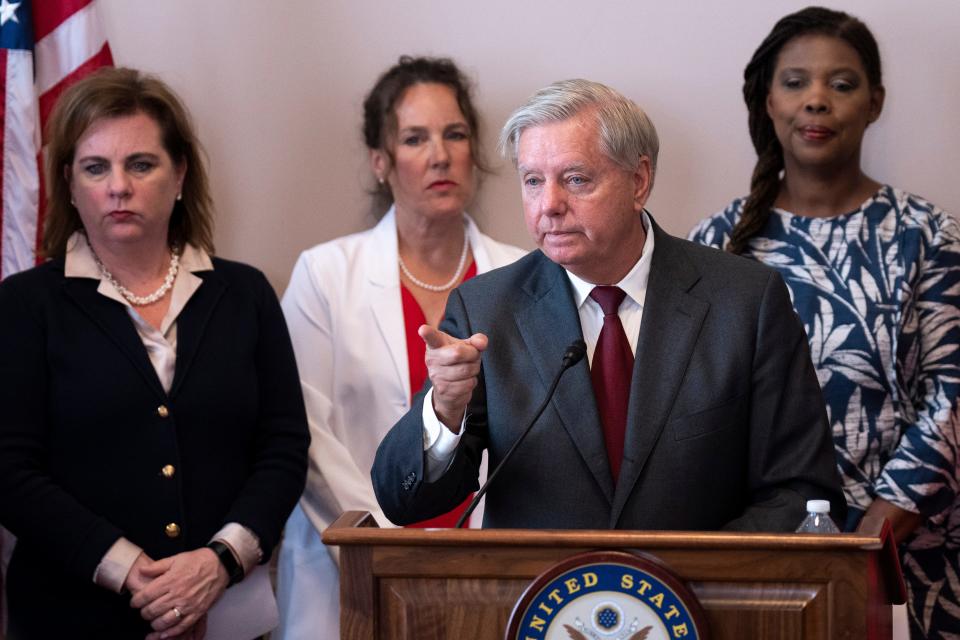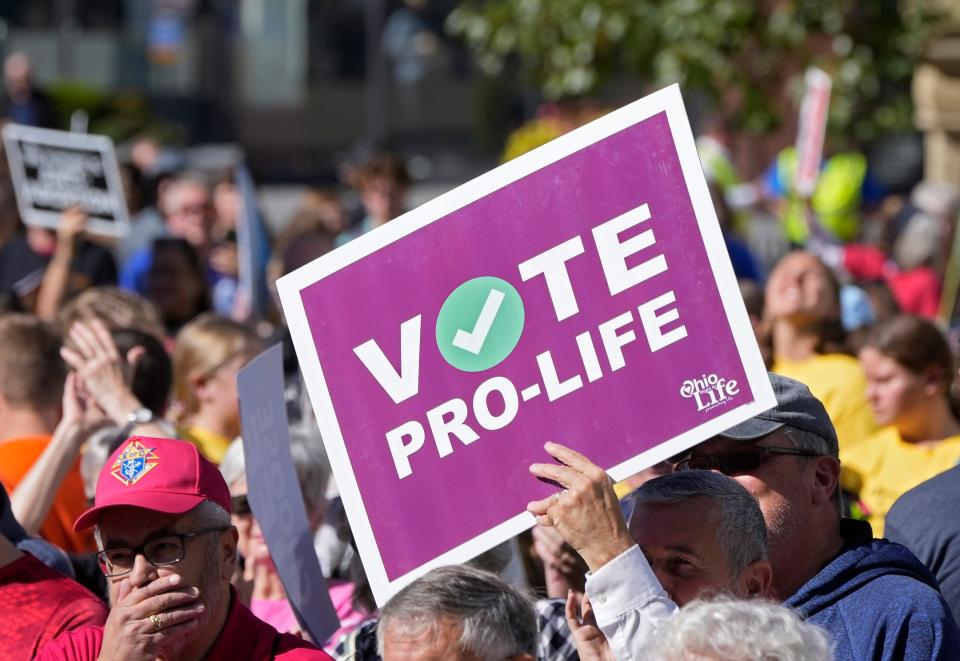Will the GOP rally around a 15-week abortion ban? Republicans debate their options
WASHINGTON — After the midterm elections Republicans may face the potential peril of success: winning a majority in Congress with the help of a base that expects them to pursue federal limitations on abortion.
Anti-abortion advocates say it is imperative that Republicans unite on a position, even though President Joe Biden has said he will veto any form of a national ban.
Sen. Lindsey Graham has sought to build consensus around federal legislation that restricts access to abortion after 15 weeks of pregnancy, except for in cases of rape, incest and life of the mother, that he and prominent anti-abortion activists say can serve as a framework for the party’s varied coalition of voters, lawmakers and prospective presidential candidates.
“If you're running for president as a Republican in 2024, it’s not enough in my view to attack extremism Democrats on abortion. You need to lay out for the country where you would be as president,” Graham told USA TODAY. “There'll be some running for office in 2024, for president, that probably would want to be more restrictive. I understand that. But I'm hoping this becomes the consensus position, because it puts us in line with the majority of Americans on a very difficult topic.”
Yet, the legislation has been met with lukewarm support from the GOP, with Republican leaders declining to endorse his bill and many senators steering clear as they center their midterm messaging on inflation and the economy. Some conservatives say they want a stricter limit than Graham proposed. Others say that regulating abortion should be a state-level decision.
Stay in the conversation on politics: Sign up for the OnPolitics newsletter

In striking down the landmark Roe v. Wade decision in June, the Supreme Court ruled that Mississippi could impose a ban on most abortions after 15 weeks of pregnancy. The ruling allowed states to impose their own regulations in the absence of a constitutional right to abortion and triggered laws in many states that effectively ban abortion.
Democrats, led by President Joe Biden, are rallying around legislation that would codify Roe, and Biden has emphasized in the final days of the midterms that passing the bill would be his first legislative priority if his party expands its Senate majority next month.
Conservative and evangelical leaders want their party to take a strong stance, too.
“I don't think we can afford to unilaterally disarm and say that we're not going to have a federal solution, when they're pushing a federal mandate,” said Ralph Reed, founder and chairman of the Faith & Freedom Coalition.
New frontier: Post-Roe, what does it mean to be anti-abortion? GOP split on what's next
Midterms a factor: Lindsey Graham's attempt at a national abortion ban could help GOP in midterms. What we know about the bill
Harris' pitch: Abortion rights activists look to VP Kamala Harris for help in midterm election fight

GOP leaders have not articulated a unified legislative approach with more conservative members favoring a bill that would ban abortions after a fetal heartbeat is detected at roughly six weeks – unless the mother’s health is in danger – and some senators opposed to getting rid of the filibuster to pass a national ban.
Republicans will have to “figure out where that sweet spot is” that can earn the most support, says Marjorie Dannenfelser, a conservative leader who stood with Graham as he announced his bill and is president of the group Susan B. Anthony Pro-Life America.
“And I think they can do that very well if they have some courage,” Dannenfelser added. “Post election there'll be no excuses. Time to go ahead and look at what you already know and move on it,” she said.
More than six in ten registered voters, 62%, oppose a six-week ban with an exception for the mother's health, according to polling from the Wall Street Journal. Policies banning abortion after 15 weeks, except in cases when the mother’s life is threatened, garnered 57% support in the survey, which was taken in August before Graham unveiled his bill.
Voters were divided on a 15-week limit gestational limit in a Morning Consult/Politico poll taken after Graham introduced legislation that included the additional exceptions of rape and incest. A slim majority of registered voters, 51%, favored the measure, and 49% opposed it. Most independents, 55%, and Democrats, 62%, were against the limit. Support was largely driven by Republicans, 70% of which backed it.
Division in the GOP over approach on abortion
Senate Minority Leader Mitch McConnell has indicated that a push in favor of abortion restrictions would be doomed from the start, because Republicans will not win enough seats in the midterms to clear the chamber's 60-vote threshold. Most of his members believe the issue should be handled by individual states, anyway, the Kentucky lawmaker said before the Senate adjourned for a long, election-year recess.
Penny Nance, president and CEO of the anti-abortion group Concerned Women for America, said she is supportive of Graham’s bid to build consensus and states with earlier prohibitions could keep them if a federal law is put in place.
“This is a very low bar for candidates. We expect pro-life candidates to support this. This should not be a problem,” Nance said.
A 20-week abortion ban that Graham introduced before the fall of Roe attracted support from nearly every Republican senator, including McConnell. Yet, just nine of Graham’s colleagues have signed on to the 15-week legislation since its September introduction.
McConnell is not among them, and just one — Florida Sen. Marco Rubio — is in a competitive race.
“I'm confident that over time that if you voted for the 20-week pain-capable bill you'll feel comfortable with this," Graham, R-S.C., said. “And there'll be more coming on.”

A bill sponsored by Rep. Chris Smith, R-N.J., that mirrors Graham’s currently has 100 cosponsors, including New York Rep. Elise Stefanik, who chairs the GOP conference and is the third-ranking Republican in the House.
Another bill introduced at the beginning of the year by Rep. Mike Kelly, R-Pa., that bans abortion much earlier, once a heartbeat is detected, and includes an exception for the life of the mother has 123 co-sponsors and the support of the conservative Republican Study Committee.
However, a source familiar with the conversations in the House said Smith’s proposal is one of three most talked by abortion-related bills among Republicans heading into the next Congress. The two other bills under discussion would prohibit the use of federal funds for abortion services — making the Hyde Amendment permanent, which lawmakers routinely attach to spending bills — and make doctors who perform failed abortions criminably liable.
First Priority: Biden vows codifying Roe decision would be first bill in an expanded Democratic majority
Riding the Wave: Channeling abortion outrage, Democratic women push for upsets in Senate elections
2024 in Sight: Who will go first in the 2024 primary election? Democrats are debating the order
House Minority Leader Kevin McCarthy said at a pre-recess news conference that he is concerned about federal funds in particular, but he said his first legislative act would be to repeal new funding for the IRS that Democrats included in their climate and health legislation.
Students for Life of America President Kristan Hawkins said her organization is working to get heartbeat legislation and bills that ban abortion from the moment of conception passed in states. But with the election in sight, she said, the group is keeping its options open at the federal level, and she suspects lawmakers are too, until it knows what the new makeup of Congress will be.
“In November going into January we'll see where folks really are, where they're going to be standing on these different bills that are being introduced,” Hawkins said.
Just around the corner
The Heritage Foundation, which heavily influences conservative policy on Capitol Hill, wants Republican lawmakers to immediately pass a range of bills that would further regulate unsuccessful abortions, cut funding for Planned Parenthood, ban sex-selective abortion and bar providers in states where abortion is legal from mailing abortion pills to individuals residing in states where abortion is outlawed.
“Once that contrast is drawn, then you build on to the gestational protections. We want to see heartbeat or better for the next presidential candidate that is conservative,” said Roger Severino, vice president of domestic policy at the Heritage Foundation.
Anti-abortion advocates acknowledge that none of the measures they are pursing can get past Biden, and that is why some conservatives are focused on establishing a framework that can be adopted by future presidential candidates.
Progressive strategy outfit Navigator Research has been message testing on the issue and says that in surveys and focus groups majorities of voters are opposed to restrictions when they are described as a nationwide ban. Based on those findings, the group’s lead pollster, Bryan Bennett, said he is deeply skeptical that Republicans will be able to convince the public to coalesce around their plans.
“I imagine that it could be a very difficult position for Republicans who are pushing an unpopular national abortion ban in Congress,” Bennett said. “I could also imagine that there could be some backlash to Republican primary candidates if they begin to start rallying around trying to push for this, because it is largely viewed as dangerous, extreme and out of touch.”
Public polling shows more nuanced views on abortion rights. While most Americans reject an outright ban on abortion, they favor some limitations around gestation.
Voters who want to restrict abortion access are key to winning the Republican nomination, and 2024 candidates will try hard to appeal to them, said Alex Conant, communications director to Rubio during his 2016 bid for the presidency.
But he said, “Republican voters tend to be pretty practical. They want to win the White House. I think Republican voters understand that you can’t change policy if you don’t win elections.”
This article originally appeared on USA TODAY: Division over 15-week nationwide abortion ban looms over Republicans

